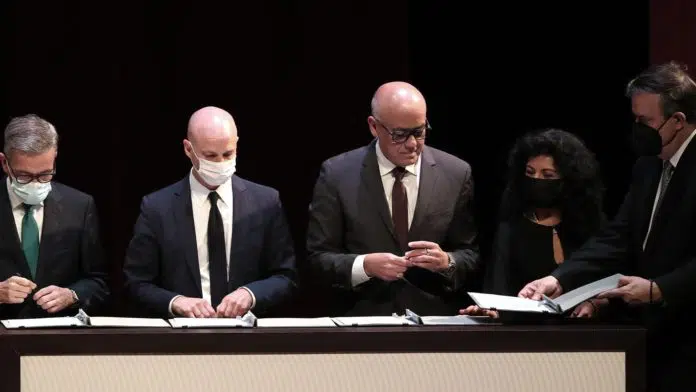
Renewed negotiations between the United Socialist Party (PSUV) government of Nicolas Maduro and the right-wing ‘Unitary Platform of Venezuela’ began in August in Mexico. Despite Covid-19 and the impact of crushing sanctions on the economy, the PSUV sits at the negotiating table in its strongest position for years. Imperialism’s great hope for ‘regime change’ has failed; self-declared ‘interim president’ Juan Guaido is increasingly a nonentity, and the opposition has been left fractured and weak.
The US, EU and Canada explicitly support negotiations; in a joint statement they have offered to ‘review sanctions’ if ‘meaningful progress’ is made. As Maduro has pointed out, ‘When we sit down at the table, we understand that we are sitting down with the US government because they [the opposition Unitary Platform] are politicians who are dependent on the US’. Imperialism’s attempts to isolate Venezuela regionally have been undermined by the elections of left-wing governments in Mexico, Argentina and Bolivia. The victory of leftist Pedro Castillo in Peru this year has effectively disbanded the vicious ‘Lima Group’ which led the attack on Venezuela. Having torpedoed previous talks in Barbados (2019) demanding the resignation of Maduro, US backing in Mexico is significant. For now, imperialism is staking its bets on major elections in November, backing the ‘moderate’ wing of the opposition who defied US demands for a boycott and won seats in the 2020 National Assembly. However, this is a change of tactics, not a change of heart.
Venezuela’s cardinal sin was to elect the late socialist president, Hugo Chavez, in 1998. He channelled oil revenues into social programmes and the Bolivarian Revolution declared its intention to build socialism. New structures of participatory democracy mobilised millions of the poor and working class. Such temerity drew the wrath of US and European imperialism, which backed coup attempts and poured billions of dollars into destabilisation. Unable to topple the Chavistas, imperialism instead turned to economic asphyxiation via sanctions. Oil production plummeted for want of diluent and trade partners, hyperinflation liquidated workers’ wages, international reserves evaporated, public spending has been slashed and imports blockaded. Concessions to big business and the partial liberalisation of the currency have driven a renewed polarisation of wealth. Flagship social achievements and experiments in popular power have been eroded. The talks in Mexico are a crucial opportunity to win economic breathing space.
Partial agreements have already been reached. One recognises Venezuela’s sovereignty over the disputed Essequibo region in Guyana; another pledges to recover frozen assets for emergency Covid-19 use. Both represent significant defeats for Guaido. In 2019, his former envoy to Britain, Vanessa Neumann, offered to give up Venezuela’s claim to the oil-rich Essequibo in exchange for British support. This bargaining chip is now off the table. Similarly, Guaido’s posturing as ‘interim president’ provided cover for imperialist countries to freeze assets including the CITGO oil subsidiary in the US and over $2bn of gold in the Bank of England. Maduro has repeatedly demanded these resources be used for food and medicine imports, securing an agreement with the UN Development Programme to administer the funds. Instead, these assets have bankrolled Guaido who splurged $6.5m of CITGO funds on legal fees in a bid to seize the gold held by Britain, while his team squandered ‘humanitarian aid’ on flashy cars, hotels and prostitutes in Colombia. Meanwhile tens of thousands of Venezuelans have died due to shortages of medicines and equipment prompting over 800 organisations, including the UN, to demand sanctions relief.
Now even the US Chamber of Commerce is clamouring for a change of tactics, citing loss of investment opportunities and the increased strength of China and Russia in the region. Following September’s round of talks, the International Monetary Fund (IMF) provided Venezuela with $5.1bn of Special Drawing Rights (an international reserve asset, convertible into multiple currencies), bumping up international reserves by 83%. Last year the IMF rejected Venezuela’s emergency Covid request, citing ‘lack of recognition’ of Maduro’s government. This time the funds form part of a $650bn ‘Covid recovery’ injection to the global economy and do not come with the usual IMF conditions demanding privatisation and austerity.
After boycotting elections since 2017, the parties of the Unitary Platform have declared they will stand in November’s ‘mega-elections’ for governors, mayors and regional legislative councils. Maduro mocked the U-turn, joking: ‘I’m going to sit in my armchair, with the television on and my popcorn, to see Juan Guaido voting on 21 November’. The US, EU and Canada now support electoral participation. Guaido has not announced his own candidacy, though his former party Popular Will is standing.
The majority of the opposition no longer recognise Guaido as their leader. Even Elliot Abrams, Trump’s ‘special envoy’ on Venezuela, mooted the ‘closing down’’ of an ‘interim government’ that only ever existed in the playbooks of Washington. Guaido’s popularity languishes around 4%. Meanwhile the PSUV government has opened 25 criminal cases against him for corruption, aggravated embezzlement, usurpation of functions, instigation of violence and more.
The talks may still unravel, with Duque’s ultra right-wing government in Colombia seizing Venezuela’s state-owned chemical subsidiary Monomeros in September, US Treasury department plans to sell CITGO shares from January 2022, and US attempts to extradite Venezuelan envoy Alex Saab from Cape Verde ongoing. But Maduro and the PSUV government currently look set to win significant concessions. Our role in Britain is to mobilise opposition against sanctions and demand the return of Venezuela’s gold.
Sam McGill
Fight Racism! Fight Imperialism! No 284, October/November 2021




